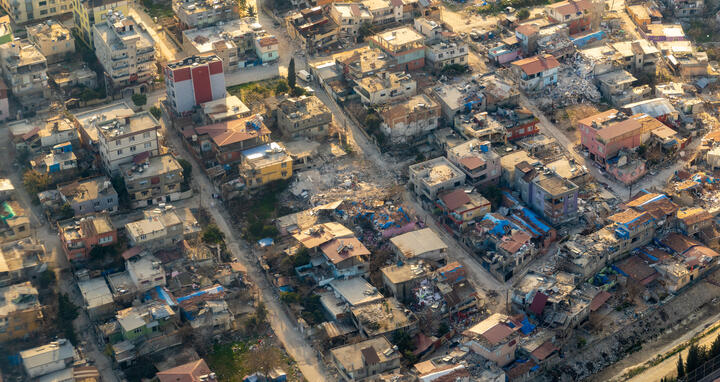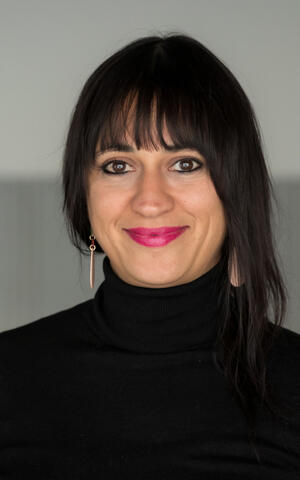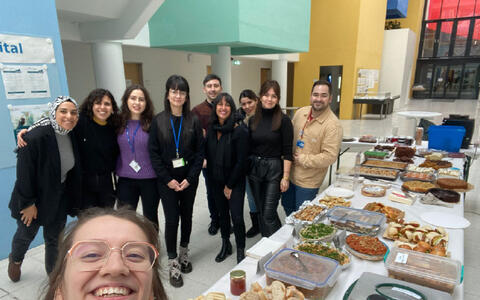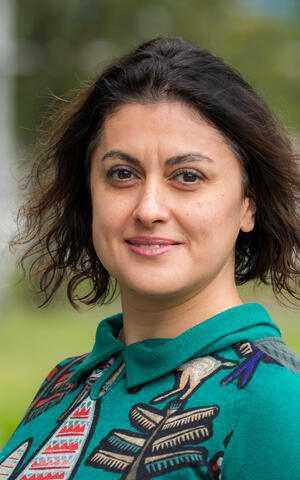“That was the only thing I could do”
Feraye Kocaoglu
The earthquake that hit southeastern Turkey and northern Syria on February 6, 2023, turned several cities into little more than heaps of rubble. Millions of people lost their homes and had to live in makeshift accommodation in tents or shipping containers. Then, in mid-April, many of the tents were blown away in a severe storm. “Help is still urgently needed,” says Feraye Kocaoglu, who works as an administrative assistant for several research labs at the Max Delbrück Center.
Kocaoglu has relatives in the affected region of Turkey. She has very clear memories of the moment she first heard about the earthquake, sitting in her hotel room on vacation in Thailand. Her first concern was for family members on her father’s side, who live in and around the large city of Adana. Thankfully, none of them were hurt. Adana is on the edge of the earthquake zone, so the damage it suffered was nowhere near as serious as in the cities at the epicenter.
Kocaoglu had already been organizing the Max Delbrück Center’s aid for Ukraine. When the Turkish/Syrian earthquake hit she started writing to her colleagues of Turkish origin, asking for their support for the earthquake victims. Still in Thailand, she began setting up a donation campaign. At that point it was not yet known that the earthquake’s final toll would be 57,000 dead and 110,000 injured.
“I couldn’t just sit back and do nothing,” says Kocaoglu. Via email and WhatsApp she organized collections of donated items and two food bazaars – one at the Berlin Institute for Medical Systems Biology (MDC-BIMSB) in Mitte and one at the campus in Buch – where people could take what they liked for a donation of their own choice. The Monday after the earthquake was Kocaoglu’s first day back at work, and the bazaars took place that Tuesday and Wednesday. “We raised an incredible €3,633,” recalls Kocaoglu, with a smile.
- A big thank you to the team of helpers!
-
-
It wasn’t only thanks to Feraye Kocaoglu and Seda Çöl Arslan that the tables at the bazaars in Mitte and Buch were groaning under the weight of numerous sweet and savory delights, but also to a wonderful team of helpers: Victoria Malchin, Firdevs Murad, Busem Ignak, Seren Sevim Wunderlich, Nihan Yildirim, Merve Alp, Ece Türkmenoglu, Emir Akmeric and Gamze Güney.
Keeping emotions in check
Seda Çöl Arslan
Among the helpers was Dr.Seda Çöl Arslan, head of the Research Funding Department. “Seda made an incredible amount of food for the bazaars at both sites,” says Kocaoglu. Cöl Arslan counters: “That was the only thing I could do.” Her family on her mother’s side comes from the region around Gaziantep, on her father’s side from Hatay. In both cities, the earthquake left barely a stone standing. Five family members died. One eight-year-old girl was rescued, but she lost her parents, her brother, and both her legs. Following the shock and horror of the disaster itself came anger and disappointment when delivery of relief supplies was delayed. Cöl Arslan still doesn’t allow herself to think too much about it: “If I let my emotions get the better of me, I won’t be able to keep functioning – and that doesn’t help anyone.” And so Cöl Arslan has been keeping her hands and mind busy.
The money raised from the bazaars was passed on to the Anatolian People and Peace Platform (AHBAP). Representatives of the NGO were on site from the very first day, providing food and water, distributing blankets, and organizing accommodation in tents and containers. Many employees at the Max Delbrück Center also donated blankets, clothing and tents. Getting these delivered to the earthquake zone turned out to be a major challenge, but Cöl Arslan and her fellow helpers finally found a Berlin care home that was able to organize an aid delivery.
Help is still needed
The team’s joy at the willingness to help and donate displayed by Max Delbrück Center staff is, however, mixed with a little sorrow. “Some of the staff members of Turkish origin felt that their colleagues could have been a bit more consolatory,” says Kocaoglu. They didn’t know how to express their grief and worried that colleagues might be irritated if they weren’t always on the ball. “A little less Western European reserve might have been comforting.” After all, it wasn’t easy for employees with family in Turkey to be here in Germany, witnessing the casualty reports unfold and being unable to do much to help.
And it’s not over yet: Turkish colleagues are regularly confronted with upsetting news. So it’s very possible the WhatsApp group will start organizing another bazaar before too long, says Kocaoglu.
Text: Jana Ehrhardt-Joswig








